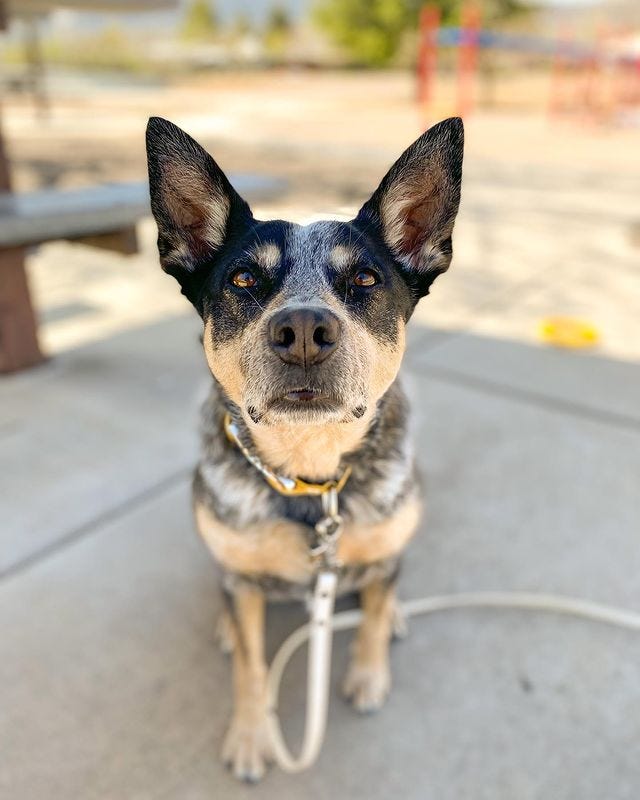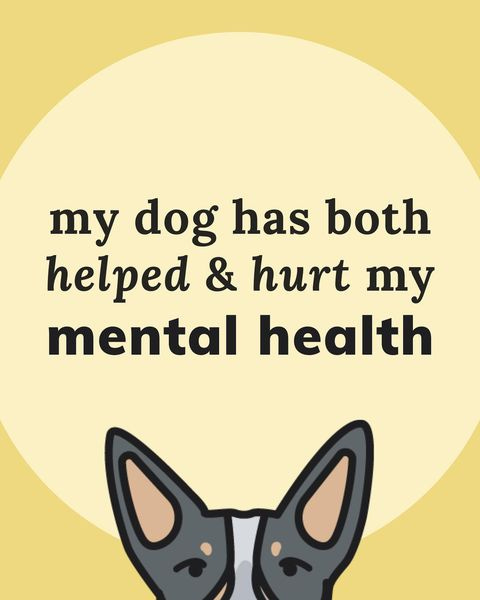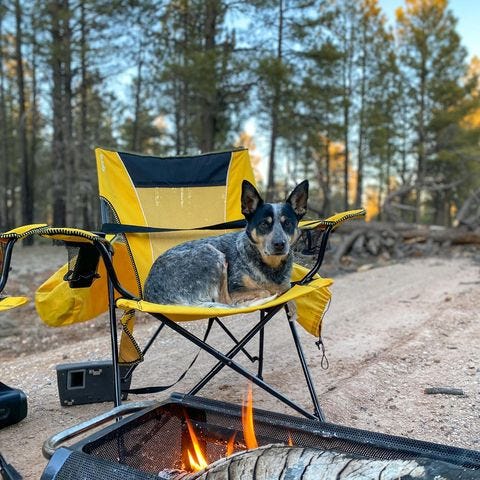Why I’d rather have an overconfident than fearful dog
If you absolutely forced me to choose.
I’d rather live with, train, and advocate for an “overconfident” dog who needs help learning self preservation… than a fearful one who needs help trying anything new.
TLDR summary
I find it easier—logistically and emotionally—to build my dog’s impulse control as opposed to confidence.
The stakes of a management or advocacy failure feel lower with a bold, exuberant dog than with a fearful, uncertain one.
I err on the anxious side myself as a human. Living with a timid creature can exacerbate pre existing worries!
First: They say “the grass is greener” for a reason
I’d be remiss not to mention the popular idiom in this conversation.
Some people have told me they wish their dog was more fearful because they think it would be easier to manage. Hearing that breaks my heart in the moment. I can’t imagine wishing the fear I’ve seen our cattle dog experience on any creature I love.
But when I take a step back? I understand how our preferences can be so relative to our experiences.
I personally find myself jealous of the owners who have dogs with tons of enthusiasm and confidence—because the biggest struggle we’ve had with Scout has not been impulse control. It’s been timidity. And I know firsthand that some others look at us and feel jealous in the reverse direction—because their struggles have been different.
It’s natural to assume other less-familiar problems might be easier to deal with. The comparison game is a compelling thing.
Ultimately I think this is another good illustration of how our personal experiences and emotions color our perceptions. And a reminder there’s no one “right” way to feel as long as we’re doing right by our dogs (and ourselves).
Why I think life with a fearful dog has been harder for me personally
Building impulse control feels more straightforward than building confidence
Resisting temptation is tough (especially for young dogs). But impulse control is a flexible skill that can be honed in a range of situations—and it’s not hard to practice day in and day out! Wacky dancing to proof stays, refining “drop” during games of tug, waiting to go through open doors…
Confidence feels more elusive. I suspect it has a stronger genetic component. It also involves more variables. Does conquering a challenge in one environment always generalize to bravery in others? How do we push our dogs to grow without taking things too far? How can we even be sure what they feel about a given situation?
These questions have plagued me for years.
Logistically: We have less wiggle room in how we handle situations
Because I’ve seen Scout be deeply affected by single bad experiences (often things I’d consider small if not for their impact on her) I’m more risk averse than I might otherwise be.
We don’t do a lot of trial and error in the sense of “oh let’s just see how this goes!” because there might be an outsized impact if a situation plays out poorly. I always have to be on top of my management and advocacy game. The stakes feel—often truly are—high.
If a friendly off-leash dog ambushes an extremely confident pet on a walk, getting all the way in their space for a greeting? That’s definitely frustrating. But probably the worst-case scenario is pretty benign: maybe some confusion about when greetings will happen or a bit of pent-up frustration. With a fearful dog, an experience like that could seriously set our progress back.
Not to mention the risks of an actual attack. Scout is more resilient than ever before. But I genuinely wonder whether we’d be able to recover if she got pinned to the ground again like she did shortly after I adopted her. It took us years to feel comfortable on walks.
If a stranger suddenly reaches for a confident dog without permission? Yeah, that’s still rude! But it’s unlikely to cause lasting damage or human reactivity. An insecure dog might generalize.
Other examples include: Accidentally stepping on Scout’s tail while she was lying down and creating a long-term startle response to people walking over her. Having a single bad blood draw at the vet that made all subsequent visits more stressful. And a bunch of other things that a solid creature like my mom’s therapy dog just shakes off right away.
Emotionally: It’s hard to watch someone I love struggle
I love Scout more than almost anything in this world. It’s horrible to watch a creature you care about—a companion you have invested your whole self into—experience all these difficult moments.
When I first adopted Scout, her default was to shut down in any unfamiliar environment. She’d freeze, curl in on herself, act like we didn’t exist, sometimes physically tremble… And it felt like there was so little I could do. Progress was sure, yes, but also slow.
Having to stand by while my dog struggled to feel safe in unavoidable daily situations—like simply walking through shared apartment hallways, being asked to pee on the side of the road, or seeing dogs from across a city block drained me in a way I wouldn’t wish on anyone.
If given the choice…
I think I’ll always prefer “annoyances” that come from positive, psyched, I’m-so-happy-to-be-here emotions than those that come from shutting down in fear.
The former can absolutely be frustrating! But it feels more straightforward to work through with some impulse control, fulfillment, and clear communication—and it doesn’t create compassion fatigue.
The latter just still breaks my heart.









